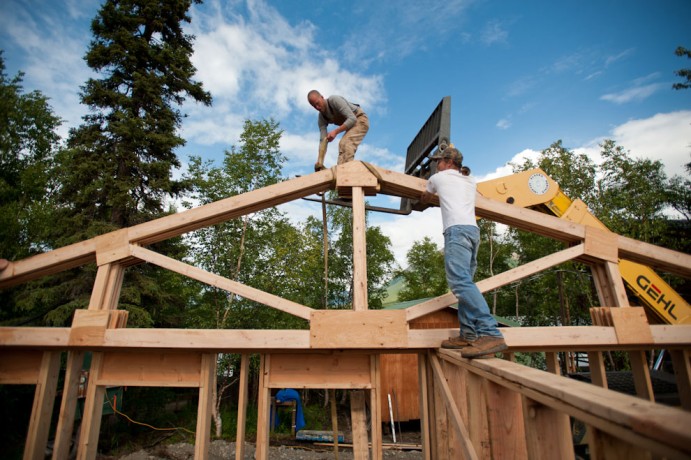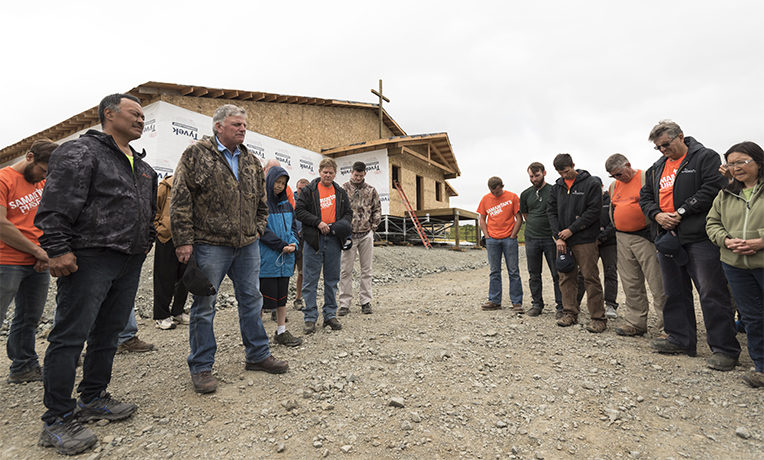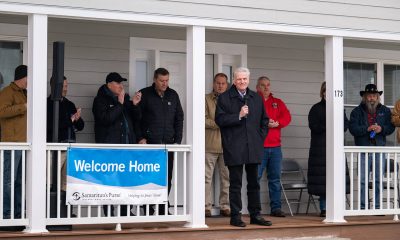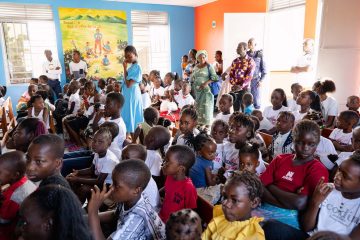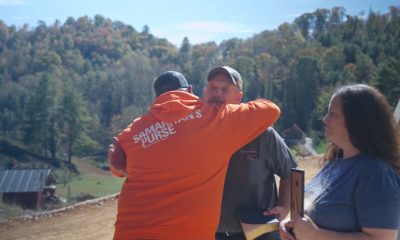Samaritan’s Purse volunteers provide remote villages with a tangible display of God's grace through church construction projects.
The salmon berries are the sweetest. They are a staple for Nellie Thomas who needs to gather enough of the fruit for herself, her husband, and both their parents.
She’ll store enough berries—including blackberries, raven berries, and blueberries—to mix in recipes and eat in meals all winter. You can’t really buy fruits and vegetables in Togiak, Alaska—at least not enough that it would matter. So, like Nellie, the residents of Togiak rely on the berry-rich summer tundra and also on the meat from caribou, moose, seal, duck, and even bear to store up for the dark winter months.
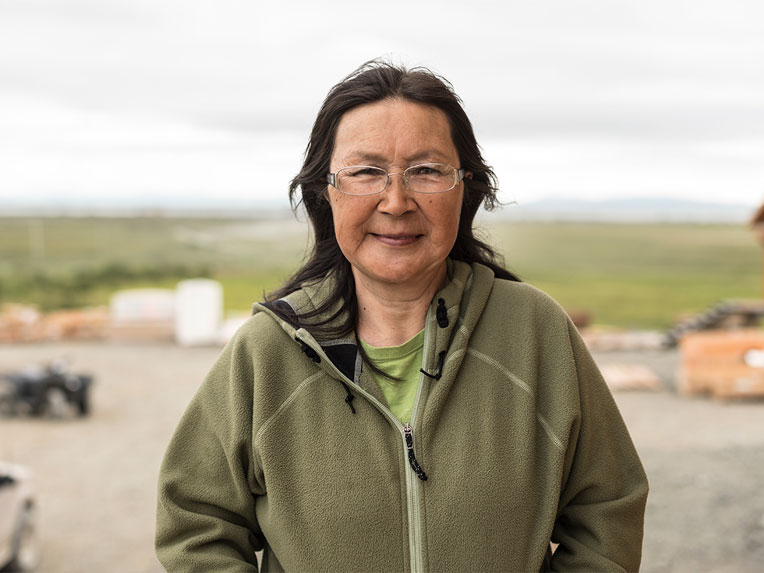
Nellie Thomas is a long-time member and leader at Togiak Moravian Church in Togiak, Alaska. The building is an answer to years of prayer and dreaming about “a church on the hill.”
Right now though Nellie is focused on sockeye salmon, as is most of Togiak, as the fish travel home to spawn. This is why she can’t stay too long talking on the hill above her beloved village where Samaritan’s Purse volunteers are busy placing siding and drywall in a new church building and parsonage.
She has to get back to fishing, she says, but she wanted to stop by to express her gratitude for the weeks of work supplied by voluntarios from all over the United States. She’d also come to greet Samaritan’s Purse President Franklin Graham, who’d arrived to meet with church members. The new building will serve as a home base for sharing the good news of Jesus Christ with the people of Togiak and surrounding villages.
Fortalecemos la iglesia local
The current location where the Moravian church meets is an out-of-date structure built in the 1950s situated in Togiak’s flood zone—a strip of shoreline skirting the Bering Sea inlet of Bristol Bay. Church members have met for more than half a century in the poorly insulated structure with single-pane windows and no indoor plumbing. Something as common as restrooms will make a significant difference to the people who worship there.
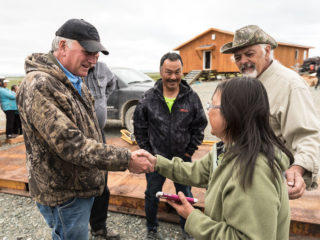
Franklin Graham meets with members of the Moravian church in remote Togiak, Alaska.
“Our young people have problems with drugs and alcohol,” says Nellie. “We need to encourage all of our young people and our youth. We need to teach them about Christ and that God exists. This new building will help us do that in Togiak.”
Representatives of the Moravian church arrived in Togiak decades ago the way most things end up there—it’s about as far as the river would take them.
“Most of Alaska is very remote, and doing a construction project up here can be very difficult,” Franklin Graham told church members. “We look for a project every year to help local churches here, and this is going to be a tremendous facility for the people of Togiak.”
“This is going to be a tremendous facility for the people of Togiak.”
Though the Yup’ik continue to see the world through a spiritual lens, they’re not bound by animistic superstition. The sight of many is now trained on God’s work in creation. They dream dreams and see visions of what He will do among them. For years some residents, even some children, had dreams of or imagined seeing a church up on the hill. Now that vision is becoming a reality.
Más que un edificio
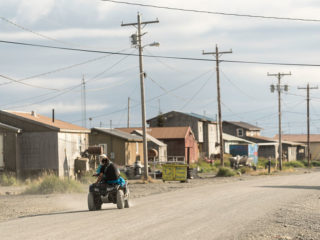
All Terrain Vehicles are the main mode of transport along Togiak’s unmarked streets and rough terrain.
The ministry of our volunteers in Togiak started days before construction began. Samaritan’s Purse volunteers took advantage of a ten-day delay in the shipping of materials from Seattle to paint two buildings—including the building belonging to the tribal council.
Because of the attention these impromptu projects gained, a young man heard the Gospel from a volunteer and received Jesus as his Savior. And once materials arrived, volunteers quickly caught up. They even found themselves three weeks ahead of schedule.
“Everything happens for a reason. One of the reasons we are here is to build this building, but that’s not the primary reason we are here. The primary reason we are here is to show these folks up here the love of Jesus,” program manager Doug Konetchy told volunteers. “Everything you do here is making a difference in the Kingdom.”
Aviation Assets Play Role in Fulfilled Dreams
When nine Liberty University aviation students and faculty, joined by several seasoned Samaritan’s Purse volunteers, arrived in Togiak in July on two of our Casa 212 airplanes, they had no idea they were fulfilling the long-dreamed dreams of a village—a village straining under the weight of poverty, substance abuse, and family crises.
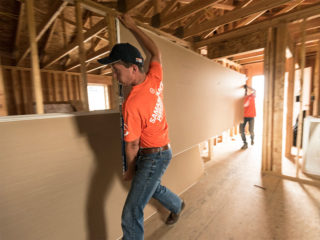
Volunteer Johnny Hewitt joined others from Liberty University’s Aviation program in constructing the new building for the Moravian Church in Togiak, Alaska.
“To see it [aviation] being used like this is just fantastic,” said student Johnny Hewitt, who traveled to Togiak with James Mashburn, the associate dean, and several others from Liberty’s Aviation Program. “There’s no other way to get here. It’s a fishing town so they do ship supplies in, but aviation is critical for getting people in and out in a timely manner.”
Fellow pilot Colt Feimster echoes this need, a need he’s wanted to be a part of meeting for a long time.
“I’ve never been on a formal mission trip, so I figured now is a good time to see how aviation is put to use,” he said. “It really can make an eternal difference.”
The young pilots saw the importance of aviation for transporting the many volunteers and other personnel it takes to accomplish projects in remote places. Thanks to the volunteer response and the planes to get them there, Samaritan’s Purse has completed 26 construction projects throughout “The Last Frontier” over the past several years.
We have a goal of accomplishing at least one such project each year until critical needs are met. Additions this year to the Moravian seminary we built last year in Bethel, Alaska, are being completed concurrently with the work in Togiak.
A Symbol on a Hill
Adherence to tradition and attention to the seasons are a matter of survival in this remote landscape, so change isn’t prized in the small villages of western Alaska. Perhaps this is why the only noticeably new building in Togiak until now has been the K-12 school, which is built up on the hill out of reach of Bristol Bay’s flood zone.
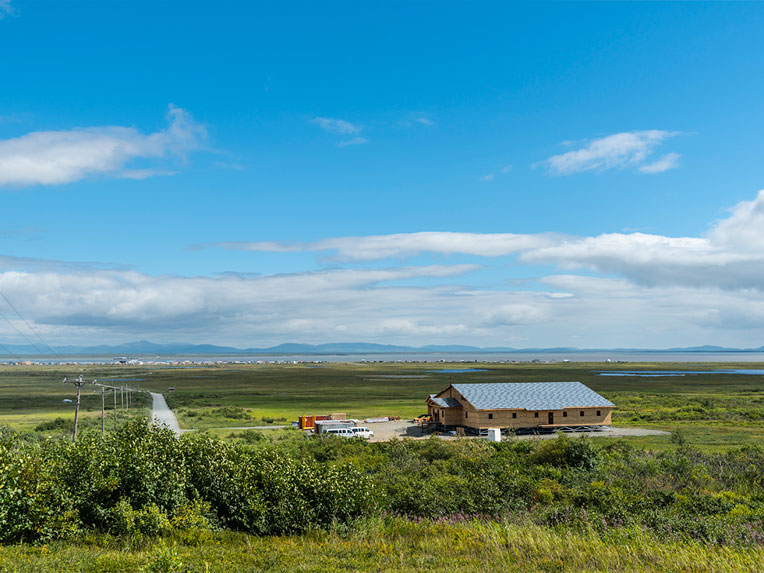
Located centrally and visibly on a tundra hill above Togiak, the new Moravian church building will be a center for hope and ministry.
And it turns out that same hill couldn’t have been a better place to build a church. As residents move further away from the flood-prone areas, they are making the church the center of this shifting population. From almost anywhere in Togiak, and even neighboring villages on the Bay, this new building is visible as a symbol of, we pray, a brighter future.
